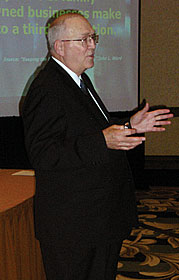
Leighty, director of business planning for Federated Insurance Co., Hurst, Texas, was speaking before the Associated Plumbing-Heating-Cooling Contractors (APHCC) of Texas at the group's annual convention in Dallas.
Leighty knows that being a business owner doesn't mean riches and rewards. It also doesn't mean that business owners have a good plan for their future. "When you step out, who is going to step in?" he asked.
Leighty suggested that business owners have two ways to exit - vertically or horizontally. Vertically is selling the business and horizontally is becoming disabled or dying. Either way, business owners often fall woefully short in planning their exit.
"The average businessperson spends 96,000 hours of their lifetime creating wealth and four hours planning how to dispose of it," he noted.
Leighty also said that only 10 percent of family-owned businesses make it to the third generation, which prompted his discussion of "senior generation goals" - goals set up by the business owner or family elder.
He said owners need to ensure the security of the family's assets because "you don't want to start all over again and get the business back." He added that children of owners need to be treated fairly and given the opportunity to progress in the business - and they shouldn't be burdened with estate and gift taxes.
Leighty listed the 10 deadly sins of succession/estate planning. The list includes:
1. Procrastination: Putting it off until tomorrow.
2. Wishful thinking: "Everyone knows what I want; we'll be fine."
3. Saving money by not seeking advice: Pay a small amount now or a large amount later.
4. Trying to beat taxes: Tax litigation ties up a business for an average of six years, seven months, and 20 days, according to Leighty.
5. Confusing equality with fairness: Believing children will all share alike.
6. Management by committee: Too many decision makers can slow the progress and put off a buyer.
7. Not sharing philosophies: Everyone has a different plan.
8. Failing to teach and test: The best time to test is while you still own the business.
9. Outdated planning: Laws keep changing and plans need to be reviewed.
10. No outside review: Not letting any succession planners review your plan.
Leighty said if business owners don't take care of planning, they could wind up in probate court where everything is public record and all of the business owner's competitors could learn his or her net worth - destroying confidentiality.
"Nothing happens until you take action," he said. "And when you take action, you feel better because you are in control."
For more information on APHCC of Texas accomplishments and Texas legislative news, visit Regional Reports at www.achrnews.com.
Publication date: 07/11/2005



